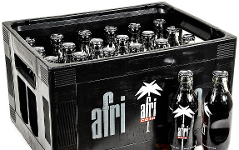Ambev
$543M 2nd Q Profit Posted By Ambev
The increase in the Sao Paulo, Brazil-based brewer’s profit from a year earlier was due to sales volumes that were the highest ever for the period and a large tax credit. Net income rose to $543 million from $244 million a year earlier. Net revenue was up 35.3 percent, and normalized earnings before interest, taxes, depreciation and amortization rose 58 percent. Sales volumes increased 19 percent to 39.8 million hectoliters. The company booked a tax credit of $300 million in the second quarter related to a ruling by Brazil's supreme court that forbade the federal government and state governments from charging the company certain taxes.
Asahi
Asahi U.K. Enlists PR Agency To Promote Grolsch, Asahi Super Dry Brands
The Woking, U.K.-based brewer has appointed The Academy (London) agency to work on its Grolsch and Asahi Super Dry beer brands, following a competitive pitch involving three other agencies. The agency’s mission is to drive integrated brand PR campaigns to strengthen consumer awareness of Grolsch and Asahi Super Dry. The work includes experiential activity, event and content production, and media and influencer relations.
Asahi Group Posts Healthy First-Half Financials
The company reported that its first-half profit to owners of parent was $723 million, compared to $263 million in the previous year. Core operating profit was up 76.6 percent. For fiscal 2021, the company projects: basic earnings per share of $2.81, profit attributable to owners of parent of $1.4 billion, core operating profit of $2 billion, and revenue of $203 billion.
Brands
Asahi Group Launches Canned RTDs with “Sour Yogurt” Taste
The Tokyo-based beer, spirits, soft drinks, and food business has launched in Japan two canned cocktails that contain fruit flavors as well as fermented milk for a “sour yogurt” taste. The four percent-ABV Asahi Luxury Shibori Plus canned chu-hai drinks roll out in Japan beginning September 7. The drinks are an extension of the Luxury Shibori RTD brand, which comprises a range of fruit-flavored canned chu-hai drinks. Chu-hai is a Japanese alcohol category mainly made up of cocktail-style drinks mixing shochu and sparkling water. The new flavors, Berry Mix and Citrus Mix, will sell for $1.30 plus tax per 35 cl can.
Carlsberg
Carlberg’s Strong First Half Financials Prompt Guidance Upgrade
The Danish brewer posted 17.7 percent sales growth in the second quarter while first half sales grew 9.9 percent to $5 billion. Volume growth reached nearly 12 percent for the first six months of the year. Noting that these figures represented a “strong set of results” for the first half, the company nevertheless warned that pandemic-related uncertainty remained, especially in Asia. Carlsberg raised its earnings guidance for the second time, and now expects organic growth in operating profit of between eight percent and 11 percent, compared with its previous forecast of 5-10 percent growth.
Carlsberg JV Partner Khetan Group Seeks Improvements In Governance
Carlsberg’s Nepal-based partner in the joint venture Carlsberg India said “grave concerns” prompted it to demand improved governance standards at their joint venture earlier this month. Khetan Group and Carlsberg have been locked in a dispute since 2019 over how Carlsberg India has conducted internal inquiries into its business practices. This has led to protests from Khetan's representatives and raised concerns from Carlsberg India's auditor, an affiliate of PriceWaterhouseCoopers. The Carlsberg India partnership is managed by C.P. Khetan for the Khetan Group. However, Carlsberg has day-to-day control as its majority shareholder, according to Khetan. India's antitrust authority found in 2020 that the company colluded with other brewers to fix beer prices. A final ruling has not yet been given.
Companies
Carlsberg Redesigns Look Of Brewmasters IPA
The company worked with Danish design agency Everland to create the new look, which aims to blend the heritage both of Carlsberg as a brewer and the IPA style with a modern appeal. A historical beer style first consumed by sailors on long sea voyages, IPA - has become a cornerstone of the craft brewing movement. Inspiration for the redesign was Carlsberg's Copenhagen brewery entrance “elefantporten,”, which is adorned with two Indian elephants. Carlsberg said the purpose of the new design is to pay tribute to its former brewmasters and to "the place and the people who made it all possible."
Suntory
Suntory Holdings Adds Canned Cocktail To Japan Highball Portfolio
The new cola-flavored cocktail (six percent ABV, $1.45 per 35 cl can)) is the latest addition to Suntory's Highball line in Japan. The new variant expands the Jim Beam Highball line, which was the first innovation to come from Suntory’s takeover of Jim Beam owner Beam Inc in 2015. The RTDs were first launched in Japan in 2016, and now include a lemonade version, released earlier this year. Tthis month, Suntory’s domestic spirits arm, Suntory Spirits, released a chu-hai RTD that contains half the sugar of a regular alcoholic canned cocktail.
Copyright 2026 Business360, Inc.

